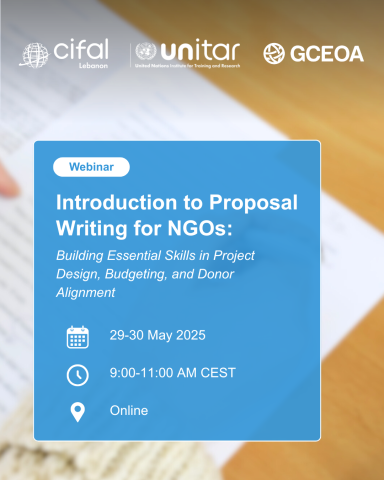
UNITAR Online Catalogue
CIFAL Lebanon - Introduction to Proposal Writing for NGOs: Building Essential Skills in Project Design, Budgeting, and Donor Alignment

People
CIFAL Lebanon, Global CEO Alliance
Background
CIFAL Lebanon is pleased to present an introductory webinar on proposal writing for NGOs, designed to build essential skills in project design, budgeting, and donor alignment. This session aims to support local and regional organizations in strengthening their fundraising capabilities and expanding their access to funding opportunities.
Over the course of two focused sessions, participants will be guided through the fundamentals of proposal development—from understanding donor types and funding structures to writing clear objectives, drafting budgets, and developing concept notes. The webinar also introduces key tools for donor analysis, internal coordination, and aligning proposals with grant guidelines and strategic priorities.
This session offers a practical foundation for NGO professionals and newcomers alike, equipping them with the tools to design compelling proposals and contribute more effectively to their organizations’ growth and sustainability.
Event Objectives
- To introduce participants to the foundational structure, purpose, and types of project proposals used in the NGO sector.
- To strengthen participants’ ability to align proposals with donor priorities and funding mechanisms.
- To guide participants through each phase of the proposal development process—from concept and design to writing and submission.
- To build practical skills in drafting core proposal sections, including problem statements, objectives, activities, and budgets.
- To enhance understanding of donor mapping, concept notes, grant guidelines, and basic monitoring and evaluation elements.
Learning Objectives
- Define what a project proposal is and describe its key types, functions, and role in fundraising.
- Distinguish between institutional and private donors and identify how to align proposals with their funding priorities.
- Outline the key phases of proposal development, including needs assessment, internal coordination, and timeline planning.
- Draft clear and compelling sections of a proposal, including the executive summary, background, goals, objectives, and activity plan.
- Develop a basic project budget and accompanying narrative that justifies line items effectively.
- Understand introductory concepts of monitoring and evaluation, including indicators and risk mitigation.
- Recognize when and how to write concept notes and conduct donor analysis for improved funding readiness.
Content and Structure
Day 1: Proposal Writing Foundations & Donor Strategy
Welcome & Objectives
- Course overview
What is a Proposal?
- Definitions, types, and functions
- The role of proposals in fundraising and organizational growth
Understanding Donors & Grant Types
- Institutional vs. private donors
- Core, project-based, and restricted funding
- How to align your proposal with donor priorities
Key Phases of Proposal Development
- From concept to submission needs assessment, design, writing
- Internal coordination and timeline planning
- Tools for donor mapping and fundraising strategy
Group Discussion and Q&A
- Common mistakes in proposal writing
- Open floor for participant questions
Day 2: Proposal Components & Budgeting Essentials
Recap of Day 1 + Warm-Up Activity
Core Sections of a Proposal
- Executive Summary
- Background & Problem Statement
- SMART goals and measurable objectives
- Activity planning, KPIs, timeline
Budgeting & M&E Overview
- Budget basics: line items, justification
- Budget narrative tips
- Brief intro to Monitoring & Evaluation (indicators, tracking)
- Risk mitigation planning
Concept Notes & Donor Readiness
- When and how to write a concept note
- Understanding grant guidelines
- Tips for conducting donor analysis
Wrap-Up & Resources
- Summary of key takeaways
- Q&A and feedback
- Share certificate process and learning resources
Methodology
This webinar will follow an interactive, step-by-step instructional format designed to introduce participants to the core principles of proposal writing and fundraising for NGOs. The session will begin with a course overview and group engagement to clarify participant expectations and establish key learning goals.
Day 1 will focus on foundational concepts, including what proposals are, their types and functions, and how they contribute to organizational growth. Participants will also explore donor types and grant categories, with practical guidance on aligning proposals with donor priorities. The session will conclude with a discussion of common mistakes and a live Q&A to promote knowledge exchange.
Day 2 will provide hands-on instruction in writing the key sections of a proposal, including SMART objectives, KPIs, timelines, and budgets. It will also introduce participants to basic monitoring and evaluation (M&E), risk mitigation, and donor readiness strategies such as concept note development and donor analysis.
Each day will feature recap activities, opportunities for participant questions, and access to practical resources. This methodology is designed to ensure that participants leave with foundational skills, increased confidence, and actionable knowledge to begin drafting competitive proposals within their organizations.
Targeted Audience
- Staff and volunteers of NGOs and civil society organizations involved in project design, fundraising, or donor engagement
- Early-career professionals and students seeking to build skills in grant writing and development funding
- Program managers, business development officers, and M&E specialists working in the development or humanitarian sectors
- Local and regional government representatives involved in project planning and resource mobilization
- Members of academic institutions, think tanks, or research centers interested in proposal development and donor alignment strategies